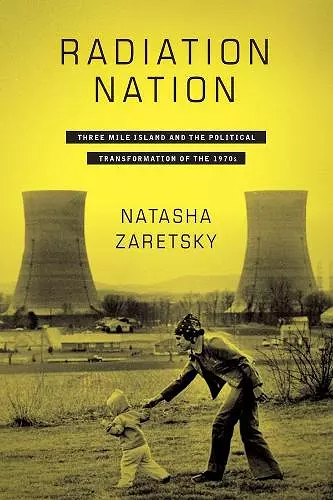Radiation Nation
Three Mile Island and the Political Transformation of the 1970s
Format:Paperback
Publisher:Columbia University Press
Published:13th Feb '18
Currently unavailable, and unfortunately no date known when it will be back

On March 28, 1979, the worst nuclear reactor accident in U.S. history occurred at the Three Mile Island power plant. Radiation Nation uses the accident to explore the late 1970s as a turning point, focusing on how women crafted a homegrown ecological politics and a new body-centered nationalism. The first cultural history of the accident, Radiation Nation reveals the surprising ecological dimensions of post-Vietnam conservatism while showing how growing anxieties surrounding bodily illness infused the political realignment of the 1970s in ways that blurred any easy distinction between left and right.
On March 28, 1979, the worst nuclear reactor accident in U.S. history occurred at the Three Mile Island power plant. In this innovative study, Natasha Zaretsky uses the near-meltdown to shed new light on the era’s political realignments. Radiation Nation uncovers the surprising bodily and ecological dimensions of post-Vietnam conservatism.On March 28, 1979, the worst nuclear reactor accident in U.S. history occurred at the Three Mile Island power plant in Central Pennsylvania. Radiation Nation tells the story of what happened that day and in the months and years that followed, as local residents tried to make sense of the emergency. The near-meltdown occurred at a pivotal moment when the New Deal coalition was unraveling, trust in government was eroding, conservatives were consolidating their power, and the political left was becoming marginalized. Using the accident to explore this turning point, Natasha Zaretsky provides a fresh interpretation of the era by disclosing how atomic and ecological imaginaries shaped the conservative ascendancy. Drawing on the testimony of the men and women who lived in the shadow of the reactor, Radiation Nation shows that the region's citizens, especially its mothers, grew convinced that they had sustained radiological injuries that threatened their reproductive futures. Taking inspiration from the antiwar, environmental, and feminist movements, women at Three Mile Island crafted a homegrown ecological politics that wove together concerns over radiological threats to the body, the struggle over abortion and reproductive rights, and eroding trust in authority. This politics was shaped above all by what Zaretsky calls "biotic nationalism," a new body-centered nationalism that imagined the nation as a living, mortal being and portrayed sickened Americans as evidence of betrayal. The first cultural history of the accident, Radiation Nation reveals the surprising ecological dimensions of post-Vietnam conservatism while showing how growing anxieties surrounding bodily illness infused the political realignment of the 1970s in ways that blurred any easy distinction between left and right.
This is an epic book, speaking to grand stakes. Centered on Three Mile Island, it is actually a chronicle of postwar America, touching on everything from atomic-age anxieties, to declining faith in expertise, to the long-grindng pessimism of the 'anthropocene.' It is, in short, brilliant, among the best works of history I have read in years. -- Jeremy Varon, the New School
- Winner of Choice Outstanding Academic Title 2018
ISBN: 9780231179812
Dimensions: unknown
Weight: unknown
312 pages